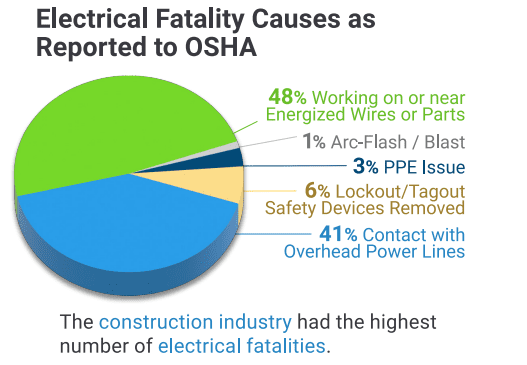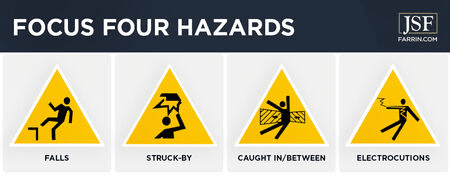Electrocution injuries can happen to anyone. Were you or a loved one hurt at work?
We can give you clarity on your case, handle everything for you, and fight for everything you may be owed. We’re on your side.

This page refers to Electrocution Injury in North Carolina.
Since laws differ between states, if you are located in South Carolina, please click here.
What to Know if You Are Electrocuted at Work in North Carolina
Many workers are exposed to electrical hazards in their workplaces. Whether working with damaged extension cord plugs in an office in Raleigh, temporary lighting systems, or faulty power connections on a construction site in Wilmington, or fixing fallen power lines or operating electrical equipment outside in the rain for Duke Energy, the threat of electrocution is real.
Electrical shocks and burns are frightening, painful, and sometimes permanent injuries. The recovery period may be long, sometimes even requiring physical therapy. Electrical current exposure may cause serious neurological damage, including brain damage, organ damage, paralysis, or even death, which may be a precursor to a wrongful death claim.
If you have been electrocuted at work, workers’ compensation may cover your injury-related expenses.
What Industries Experience the Most Electrocution Injuries and Deaths?
Electrocution injuries and deaths happen most frequently in the construction, maintenance, and manufacturing industries but can happen to nearly any type of worker. Those industries may have more risks, but as North Carolina grows, many non-construction workers may find themselves in construction zones.
Electrocution at work occurs when workers receive electrical shocks. The most common electrocution injury is a burn.
Contact with electricity can cause many other types of injuries. An electrocuted worker may fall from a ladder, for example. Proximity to water brings with it the chance that an electrocuted worker could fall in and drown. Once disabled by electrocution, falling, crushing, and other types of injuries become a threat. If you’re using a forklift and it touches a live wire, you could lose consciousness or control of the vehicle.
If you or a loved one sustained an electrocution injury on the job in North Carolina, don’t hesitate to contact the Law Offices of James Scott Farrin. We have the experience and resources to help you pursue the compensation and benefits you need.
What Jobs Are Most at Risk for Electrocution in North Carolina?
The Occupational Safety and Health Administration (OSHA) highlights the following as common electrical hazards that may result in electrical shocks and burns:
- Dangerous power connections
- Damaged extension cord plugs
- Temporary lighting systems
- Accidental energizing of equipment
- Contact with overhead electrical wires and fallen power lines
- Working in damp or wet locations while operating electrical equipment
While some of these events occur in many, if not most, occupations, jobs dealing with installation, maintenance, repair, and service account for the highest number of electrocution accidents at work.
Electrocution in the Construction Industry
Construction workers have been found to be four times more likely to be electrocuted than workers in all other industries combined. OSHA has even included electrocution as one of the Focus Four Hazards for the construction industry. OSHA has also created electrical standards, training, and regulations to protect construction workers from injuries and deaths caused by electrocution.
What Kind of Injuries Could I Sustain if I Was Electrocuted at Work?
According to the Centers for Disease Control and Prevention (CDC), electrical injuries at work fall into four categories:
- Fatal electrocution
Example: a crane worker is electrocuted when his crane gets tangled in a live power line - Electric shock
Example: an office worker gets shocked trying to fix a broken copier - Electric burns
Example: a welder gets a thermal burn from a faulty welding iron - Falls due to contact with electricity
Example: a power line worker falls from the aerial bucket after being shocked working on a transformer
These injuries are caused by many different situations, but the most common workplace electrical hazards include:
- Inadequate wiring
Example: using an extension cord with insufficient wiring for a power tool - Overloads
Example: plugging too many devices into a power strip - Ungrounded electrical circuits
Example: holding a drill that is connected to an ungrounded circuit - Temporary wiring
Example: damaging the electrical cord of the lightswhile stapling a string of lights into place - Overhead power lines
Example: touching a live downed power line - Unlabeled live parts of electrical equipment
Example: coming into contact with an electrical current of live equipment
Who Is Liable if I Am Electrocuted at Work in North Carolina?
Workers’ compensation is a “no fault” system, which means that you are likely entitled to workers’ compensation benefits even if it was your fault that you were electrocuted at work. Workers’ compensation insurance helps employers provide qualifying injured workers with medical care and compensation for the wages they lost while unable to return to work.
If an electrocution injury or death is caused by a person or company other than your employer, called a third party, you could potentially file a workers’ compensation claim with your employer, as well as a third-party claim against that other person or organization. Examples of third parties who could potentially be held liable for your electrocution injury or the electrocution death of a loved one would include power companies, contractors, and property owners.
What Do I Do if I Am Electrocuted at Work?
If you were electrocuted on the job, you should follow these steps:
- Seek medical care, even if you are not showing symptoms. Some injuries may be internal and you may not have immediate symptoms.
- Notify your employer of the incident, preferably in writing, as soon as possible after the accident.
- Record all the details about the accident. Keep records of your medical treatment and all communications about the accident.
- File necessary paperwork. In North Carolina, it is the employee’s responsibility to file a workers’ comp claim, and in South Carolina, it is the employer’s responsibility.
- Talk to a workers’ compensation lawyer for guidance about your options.
Those who have been injured by electric shock can experience electrolyte disturbances in the body and are prone to kidney injury.
What Kind of Compensation Can I Expect if I Was Electrocuted at Work?
You may be eligible for the following types of workers’ compensation benefits if you were electrocuted at work:
- Medical bills, such as doctors’ bills, hospital bills, physical therapy, and medications
- Lost wages if you are unable to work on a temporary or permanent basis
- Vocational rehabilitation if you are unable to continue in your current occupation
Electrocution injures can be devastating. In addition to healing, you need to continue paying your bills and may be providing for your family. We encourage you to seek legal advice as soon as possible after being injured to discuss filing a workers’ compensation claim. It’s important to understand what compensation you may be able to expect to help you through this difficult time.
Skilled North Carolina Workers’ Compensation Attorneys With Experience
If you or a loved one has been electrocuted at work, you should contact an experienced workers’ compensation lawyer. The workers’ comp team at the Law Offices of James Scott Farrin offers you considerable breadth and depth of experience in workers’ compensation law, including:
- Several attorneys who have 10+ years of experience advocating for employees on workers’ compensation cases
- Former insurance company defense lawyers and paralegals with an inside view of how the “other guys” work and think
- Two former North Carolina Industrial Commissioners who helped the agency administer and enforce workers’ comp laws
And that’s not all. Several of our workers’ compensation attorneys have been recognized over the years by their peers, including:
- “Best Lawyers in America – Workers’ Compensation Law, Claimants” 2026 list4 by Best Lawyers
- “Best Lawyers in America: Ones to Watch – Workers Compensation Law, Claimants” 2026 list honorees4 by Best Lawyers
- “Lawyer of the Year – Workers’ Compensation Law, Claimants” 2022 award recipient4 by Best Lawyers
At our firm, many of our workers’ comp attorneys are North Carolina State Bar Board Certified Specialists in Workers’ Compensation Law, something only a small fraction of attorneys licensed in North Carolina have achieved.
So, if you are reading this and thinking, “I got electrocuted at work – now what?” we may be able to help. Call 1-866-900-7078 or fill out this free case evaluation form today. Tell them you mean business.




